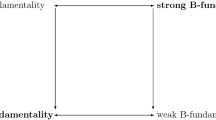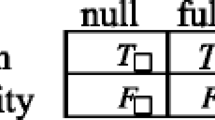Abstract
This note argues against Barwise and Etchemendy's claim that their semantics for self-reference requires use of Aczel's anti-foundational set theory, AFA, and that any alternative “would involve us in complexities of considerable magnitude, ones irrelevant to the task at hand” (The Liar, p. 35).
Switching from ZF to AFA neither adds nor precludes any isomorphism types of sets. So it makes no difference to ordinary mathematics. I argue against the author's claim that a certain kind of ‘naturalness’ nevertheless makes AFA preferable to ZF for their purposes. I cast their semantics in a natural, isomorphism invariant form with self-reference as a fixed point property for propositional operators. Independent of the particulars of any set theory, this form is somewhat simpler than theirs and easier to adapt to other theories of self-reference.
Similar content being viewed by others
Author information
Authors and Affiliations
Additional information
I thank John Mayberry for discussions of axiomatics which inspired this paper. Jon Barwise's criticism of an earlier draft improved this one as did an anonymous referee.
Rights and permissions
About this article
Cite this article
McLarty, C. Anti-foundation and self-reference. J Philos Logic 22, 19–28 (1993). https://doi.org/10.1007/BF01049179
Issue Date:
DOI: https://doi.org/10.1007/BF01049179




